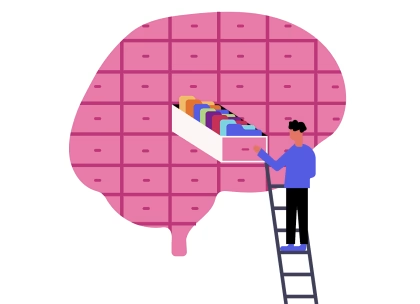Cognitive performance refers to the efficiency of mental processes like thinking, learning, memory, problem-solving, and attention. Key factors affecting it include sleep, nutrition, exercise, and stress management. Enhancing cognitive performance can improve productivity and decision-making through cognitive training, mindfulness, and advanced technologies like neurofeedback and VR.
Table of Contents
Introduction to Cognitive Performance
Have you ever wondered why some days you can clearly remember locking your front door in the morning while heading off to work, while other days you can’t recall at all? Chances are, you’ve experienced both kinds of days. This variability is a common example of how cognitive performance fluctuates, influencing our memory, attention, and overall mental clarity. Several factors can amplify cognitive performance, such as adequate sleep, proper nutrition, regular exercise, and stress management.
Conversely, poor sleep, unhealthy eating habits, high stress levels, and lack of physical activity can significantly lower cognitive performance. Understanding these factors can help us better manage our daily tasks and improve our cognitive health.
What is cognitive performance?
Cognitive performance refers to the efficiency and effectiveness of mental processes such as thinking, learning, memory, problem-solving, and attention. It encompasses a range of cognitive functions that enable individuals to process information, make decisions, and execute tasks. Key components of cognitive performance include memory (the ability to store and recall information), attention (the capacity to maintain focus on tasks), executive function (the ability to plan, organize, and manage tasks), and processing speed (the rate at which one can understand and respond to information).
Optimal cognitive performance is crucial in both personal and professional contexts. It impacts how well individuals can adapt to new situations, solve problems, and perform under pressure. Various factors influence cognitive performance, including genetics, health, lifestyle choices (such as diet, exercise, and sleep), and environmental conditions (like noise levels and work environment).
Enhancing cognitive performance can be achieved through cognitive training exercises, maintaining a healthy lifestyle, using advanced technologies (such as neurofeedback and biometric tools), and practicing mindfulness and meditation. By understanding and improving cognitive performance, individuals can enhance their productivity, creativity, and overall quality of life.

Importance of Cognitive Performance
In today’s fast-paced and complex world, we are constantly bombarded with information and cognitive-heavy tasks. High cognitive performance can lead to better decision-making, enhanced problem-solving skills, and increased productivity. Conversely, cognitive deficits can impede professional growth and hinder personal development. For example, in high-stakes professions such as healthcare, finance, and technology, the ability to process information quickly and accurately can be the difference between success and failure.
Moreover, cognitive performance is not static; it can be influenced by a variety of factors, including lifestyle choices, environmental conditions, and mental health. This dynamic nature makes it all the more important for professionals to regularly assess and seek to improve their cognitive functions.
Factors Affecting Cognitive Performance
Cognitive performance is influenced by a multitude of factors that can either enhance or impair mental processes. Understanding these factors is crucial for professionals looking to optimize their cognitive abilities. In this chapter, we will explore the key environmental, lifestyle, and technological factors that affect cognitive performance, providing insights into how professionals can manage and improve their cognitive health.
External Environmental Influences
The environment in which we work and live has a significant impact on cognitive performance. Several environmental factors can either support or hinder cognitive function:
- Work Environment: A well-designed work environment can boost productivity and cognitive performance. Factors such as ergonomic furniture, proper lighting, and minimal noise can create a conducive atmosphere for concentration and mental efficiency. Open spaces, access to nature, and quiet zones for focused work are also beneficial.
- Lighting: Exposure to natural light has been shown to improve mood, alertness, and cognitive function. Conversely, poor lighting conditions, especially dim or harsh artificial light, can lead to eye strain and fatigue, impairing cognitive performance. Incorporating natural light sources and using adjustable lighting can help mitigate these effects.

- Noise Levels: Excessive noise can be a major distraction and negatively impact cognitive performance. Chronic exposure to high noise levels can increase stress and reduce the ability to concentrate. Implementing soundproofing measures and creating quiet workspaces can help manage noise levels and enhance cognitive function.
Lifestyle Factors
Our daily habits and lifestyle choices play a crucial role in determining our cognitive performance. Key lifestyle factors include:
- Sleep: Quality and quantity of sleep are fundamental to cognitive health. Lack of sleep or poor sleep quality can impair memory, attention, and decision-making abilities. Establishing a consistent sleep schedule, creating a restful sleep environment, and practicing good sleep hygiene can significantly improve cognitive performance.
- Diet: Nutrition has a direct impact on brain function. A balanced diet rich in fruits, vegetables, whole grains, lean proteins, and healthy fats supports optimal cognitive performance. Specific nutrients, such as omega-3 fatty acids, antioxidants, and vitamins, are particularly beneficial for brain health. Avoiding excessive sugar and processed foods can also help maintain cognitive function.
- Exercise: Regular physical activity enhances cognitive performance by improving blood flow to the brain, reducing stress, and promoting the release of brain-derived neurotrophic factor (BDNF), which supports neuron growth and survival. Incorporating a mix of aerobic exercise, strength training, and activities that improve flexibility and balance can provide comprehensive benefits for cognitive health.
- Stress Management: Chronic stress can have a detrimental effect on cognitive performance, impairing memory, attention, and decision-making. Effective stress management techniques, such as mindfulness meditation, deep breathing exercises, and regular physical activity, can help mitigate the impact of stress on cognitive function.
Technological Impacts
In today’s digital age, technology plays a dual role in influencing cognitive performance. While it offers tools that can enhance cognitive function, it also presents challenges that can hinder performance:
- Digital Devices and Screen Time: Prolonged screen time and constant use of digital devices can lead to cognitive overload, eye strain, and decreased attention span. Setting boundaries for screen time, taking regular breaks, and using blue light filters can help mitigate these effects.
- Cognitive Training Apps: Numerous apps and digital platforms offer cognitive training programs designed to enhance specific cognitive functions, such as memory, attention, and problem-solving skills. While research on their long-term effectiveness is ongoing, these tools can provide valuable short-term benefits when used consistently.

Improving Cognitive Performance
Enhancing cognitive performance is a multifaceted endeavor that involves adopting various strategies and tools designed to optimize mental function. In this chapter, we will explore practical methods for improving cognitive performance, ranging from cognitive training and lifestyle adjustments to the use of advanced technologies and mindfulness practices. By integrating these approaches, professionals can boost their cognitive abilities and achieve greater success in their personal and professional lives.
Cognitive Training
Cognitive training, also known as brain training, involves exercises and activities designed to improve specific cognitive functions. Here are some effective cognitive training methods:
- Brain Training Apps: As mentioned before, several apps, such as Lumosity and CogniFit, offer targeted exercises to enhance memory, attention, processing speed, and problem-solving skills. These apps provide personalized training programs and track progress over time, making them accessible and convenient tools for cognitive improvement.
- Puzzles and Games: Engaging in puzzles and games, such as crosswords, Sudoku, chess, and strategy games, can stimulate cognitive function and enhance problem-solving abilities. These activities challenge the brain, encouraging it to develop new neural connections and improve overall cognitive performance.
- Educational Courses and Learning: Continuously learning new skills and subjects can keep the brain active and engaged. Enrolling in educational courses, learning a new language, or picking up a musical instrument are excellent ways to challenge the brain and promote cognitive growth.

Lifestyle Adjustments
Certain lifestyle choices have a significant impact on cognitive performance. Making positive changes in these areas can lead to substantial improvements in mental function:
- Sleep Hygiene: Ensuring adequate and high-quality sleep is crucial for cognitive health. Establish a regular sleep schedule, create a restful sleep environment, and avoid stimulants like caffeine and electronics before bedtime to improve sleep quality and, consequently, cognitive performance.
- Nutrition: A balanced diet rich in brain-boosting nutrients is essential for optimal cognitive function. Incorporate foods high in antioxidants, omega-3 fatty acids, vitamins, and minerals. Examples include leafy greens, fatty fish, berries, nuts, and seeds. Staying hydrated and reducing intake of processed foods and sugars also support cognitive health.
- Physical Exercise: Regular physical activity enhances cognitive performance by increasing blood flow to the brain and promoting the release of neurotrophic factors. Aim for a mix of aerobic exercise, strength training, and activities that improve flexibility and balance. Even moderate exercise, such as walking or yoga, can have significant cognitive benefits.
Mindfulness and Meditation
Mindfulness and meditation practices have been shown to significantly enhance cognitive performance by reducing stress, improving focus, and promoting emotional regulation:
- Mindfulness Meditation: Practicing mindfulness meditation involves paying attention to the present moment without judgment. Regular mindfulness practice can improve attention, working memory, and cognitive flexibility. Techniques include focused breathing, body scans, and mindful observation.

- Guided Meditation: Using guided meditation apps and resources, such as Headspace or Calm, can help individuals develop a regular meditation practice. These tools provide structured sessions and guidance, making it easier to incorporate meditation into daily routines.
- Yoga and Tai Chi: These mind-body practices combine physical movement, breathing exercises, and meditation, offering holistic benefits for cognitive and physical health. Regular practice can improve concentration, reduce anxiety, and enhance overall cognitive function.
Measuring Cognitive Performance With Advanced Technologies
Traditionally, cognitive performance has been measured using standardized tests designed to evaluate specific mental processes. These cognitive performance tests, such as IQ tests and memory assessments, provide a snapshot of an individual’s cognitive abilities. However, these methods have significant limitations, as they often fail to capture the complexity and variability of real-world cognitive functioning.
Advancements in technology have introduced new ways to measure cognitive performance more comprehensively. Digital tools and platforms with user-friendly interfaces, such as iMotions Lab, now make it easier for professionals to assess cognitive performance. These tools provide actionable insights, enabling users to monitor their cognitive health over time and identify areas for improvement.
- Biometric Tools: Modern biometric measures, such as eye tracking, electroencephalography (EEG), and galvanic skin response (GSR), offer detailed insights into how individuals process information and respond to stimuli. These technologies can reveal underlying cognitive processes that traditional tests might miss, providing a more holistic view of cognitive performance. These tools can monitor cognitive performance in real-time, providing valuable data on attention, emotional response, and mental workload. These insights can guide personalized cognitive training and improvement plans.
- Neurofeedback: This technique involves training the brain to self-regulate by providing real-time feedback on brainwave activity. Neurofeedback can improve attention, reduce stress, and enhance overall cognitive function. It is often used in clinical settings but is increasingly available through consumer devices.
- Virtual Reality (VR): VR technology offers immersive cognitive training experiences that can improve spatial awareness, memory, and problem-solving skills. VR-based cognitive training programs can simulate real-world scenarios, providing engaging and effective cognitive exercises.

By integrating these advanced technologies, it is possible to gain a more comprehensive understanding of cognitive performance and implement more effective strategies for cognitive enhancement.














